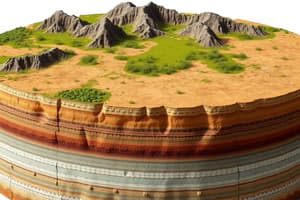Podcast
Questions and Answers
What is the geosphere composed of?
What is the geosphere composed of?
- Atmosphere, hydrosphere, and biosphere
- Lithosphere, asthenosphere, and mesosphere
- Mantle, lithosphere, and asthenosphere
- Crust, mantle, and core (correct)
Which layer of the Earth is responsible for generating the planet's magnetic field?
Which layer of the Earth is responsible for generating the planet's magnetic field?
- Mantle
- Inner core
- Outer core (correct)
- Crust
How are igneous rocks formed?
How are igneous rocks formed?
- Through high pressure and temperature causing metamorphism
- From the solidification of magma or lava (correct)
- By the accumulation of sediments over time
- Through the cooling and solidification of water
What geological events occur when tectonic plates slide past each other?
What geological events occur when tectonic plates slide past each other?
Which type of rock results from the metamorphism of existing rocks?
Which type of rock results from the metamorphism of existing rocks?
What is the main driving force behind plate tectonics movement?
What is the main driving force behind plate tectonics movement?
What process changes metamorphic rocks from other types of rocks?
What process changes metamorphic rocks from other types of rocks?
Which type of rocks originate from the accumulation and compaction of sediments?
Which type of rocks originate from the accumulation and compaction of sediments?
What are the essential components of soil?
What are the essential components of soil?
Which atmospheric gas has seen an increase due to human activities like burning fossil fuels?
Which atmospheric gas has seen an increase due to human activities like burning fossil fuels?
How do biologists contribute to understanding Earth's ecosystems?
How do biologists contribute to understanding Earth's ecosystems?
What does Earth science provide us with to confront challenges like climate change?
What does Earth science provide us with to confront challenges like climate change?
Study Notes
Exploring Our World: A Journey through Earth Science
Earth science encompasses the study of our planet's physical, chemical, and living systems. It's a vast and interconnected field that offers us a deep understanding of our home and the natural processes that shape it. Let's delve into several key concepts in earth science that will help us appreciate the complexity and beauty of our world.
The Geosphere
The geosphere comprises everything beneath Earth's surface, including the crust, mantle, and core. The crust is the thin outermost layer where life as we know it exists. The mantle, which lies beneath the crust, is a hot, viscous rocky layer that moves slowly, contributing to plate tectonics. The core, found deep within Earth, consists of a solid inner core and a liquid outer core, and it generates our planet's magnetic field.
Plate Tectonics
The theory of plate tectonics explains how the lithosphere, or the outermost part of the mantle and the crust, is divided into large, continuous plates. Over time, these plates move in response to convection currents within the mantle. When plates collide, diverge, or slide past each other, this creates a variety of geological features and events, including mountain ranges, mid-ocean ridges, and earthquakes.
Rocks
Rocks are classified as igneous, metamorphic, or sedimentary. Igneous rocks, like granite and obsidian, form from the solidification of magma or lava. Metamorphic rocks, such as marble and schist, are changed from other types of rocks due to heat, pressure, or the influence of water. Sedimentary rocks, like sandstone and limestone, originate from the accumulation and compaction of sediments, such as sand, mud, and shell fragments.
Soil
Soil is a vital part of Earth's ecosystem and is essential for growing plants and sustaining life. Soil is made up of water, air, organic matter, and inorganic particles such as sand, silt, and clay. Different types of soil can support diverse plant species, and a healthy soil ecosystem promotes plant growth and nutrient cycling.
Water
Water is an essential component of Earth's ecosystems, and its distribution and movement play a significant role in shaping our planet's geology, climate, and life. Water exists in various forms, including oceans, lakes, rivers, ice, and groundwater. The water cycle, consisting of evaporation, condensation, precipitation, and infiltration, ensures a constant flow of water.
Atmosphere
Earth's atmosphere is made up of several gases, including nitrogen, oxygen, carbon dioxide, and water vapor. These gases, along with other constituents, play a crucial role in maintaining our planet's temperature, enabling life, and regulating weather patterns. Human activities, such as burning fossil fuels, have led to an increase in atmospheric carbon dioxide levels, resulting in global warming and climate change.
Life on Earth
Life on Earth is diverse and interconnected, with organisms occupying a wide range of habitats and ecosystems. From microscopic bacteria to complex animals, life on Earth has evolved over billions of years to adapt to our planet's changing conditions. Biologists continue to study the intricate relationships between species and their environments to better understand the workings of our planet's ecosystems.
In conclusion, earth science offers us a deeper understanding of our world and the processes that shape it. By studying the geosphere, plate tectonics, rocks, soil, water, atmosphere, and life on Earth, we can appreciate the complex and interconnected systems that sustain our planet. Earth science provides us with the knowledge and tools to confront the challenges of our time, such as climate change, and to make informed decisions about our future on this remarkable planet.
Studying That Suits You
Use AI to generate personalized quizzes and flashcards to suit your learning preferences.
Description
Test your knowledge of key concepts in earth science, including the geosphere, plate tectonics, rocks, soil, water, atmosphere, and life on Earth. Explore the interconnected systems that shape our planet and learn about its diverse ecosystems and natural processes.




